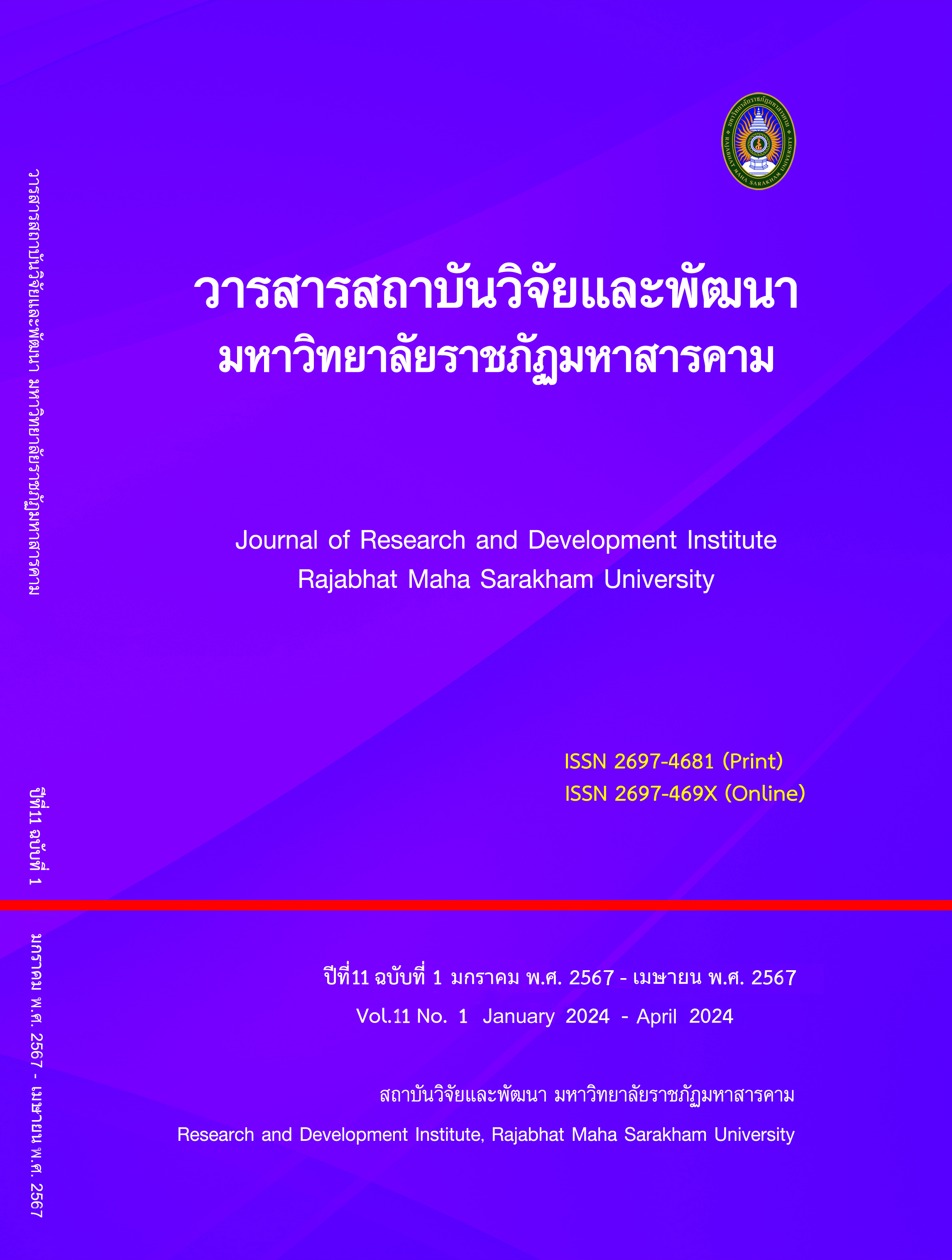Transformational leadership: demonstrated effects on the Thai Millennial cohort
Keywords:
Transformational Leadership, Intrinsic Motivation, Working Environment, ThailandAbstract
In the face of fierce global economic competition, human resources among organizations have become pertinent in boosting competitiveness. Success in both human resources and organization management relies on leadership skills. Transformational leadership is notable for its ability to approach and engage the follower's motivation differently as teams and individually, along with adaptability in uncertain situations. Thailand, as one of the developing countries in Southeast Asia, needs to investigate the leadership style that fits in its national context. As millennial workers become crucial players with their distinct characteristics, it is essential to investigate a way to attract, train, and retain this cohort since they should soon enter the arena. Therefore, this study aims to contribute to the significance and a better understanding of how effective transformational leadership reflects on Thai Millennial workers and their intrinsic motivation and working environment from their perspectives. By conducting the research through quantitative data collected from the survey, the results show that transformational leadership has been well-performed in Thai workplaces and has a significant positive relationship with mediators; intrinsic motivation, and the working environment.
References
Antonakis, J. (2001). The validity of the transformational, transactional, and laissez-faire leadership model as measured by the multifactor leadership questionnaire (MLQ 5X). Dissertation Abstracts International Section A: Humanities and Social Sciences, 62(1-A), 233.
Anurit, P. J., Selvarajah, C. & Meyer, D. (2011). Exploring Relevant Dimensions to Leadership Excellence In Thailand. International Journal of Academic Research in Business and Social Sciences, 1(3).
Bass, B. M. & Riggio, R. E. (2010). The Transformational Model of Leadership. In Leading organizations: perspectives for a new era (pp. 76–86). essay, SAGE.
Breevaart, K., Bakker, A., Hetland, J., Demerouti, E., Olsen, O. K. & Espevik, R. (2013). Daily transactional and transformational leadership and daily employee engagement. Journal of Occupational and Organizational Psychology, 87(1), 138–157. https://doi.org/10.1111/joop.12041
Chaudhuri, J. D. (2019). Stimulating Intrinsic Motivation in Millennial Students: A New Generation, a New Approach. Anatomical Sciences Education, 13(2), 250–271. https://doi.org/10.1002/ase.1884
Chen, P. J. & Choi, Y. (2008). Generational differences in work values: a study of hospitality management. International Journal of Contemporary Hospitality Management, 20(6), 595–615. https://doi.org/10.1108/09596110810892182
Gursoy, D., Maier, T. A. & Chi, C. G. (2008). Generational differences: An examination of work values and generational gaps in the hospitality workforce. International
Journal of Hospitality Management, 27(3), 448–458. https://doi.org/10.1016/j.ijhm.2007.11.002
Kamgoen, P. & Duangkaew, R. (2008). How Thai Culture Affects Expatriates’ Leadership A Case Study of CBRE.Master Thesis in Business Administration,Programme for Managing People, Knowledgeand Change, Lund University.
Khan, H., Rehmat, M., Butt, T. H., Farooqi, S. & Asim, J. (2020). Impact of transformational leadership on work performance, burnout and social loafing: a mediation model. Future Business Journal, 6(1). https://doi.org/10.1186/s43093-020-00043-8
Khawama, A. M., DiDonab, T. & Hernándezc, B. S. (2017). Effectiveness of Teamwork In the Workplace (Vol. 32). International Journal of Sciences: Basic and Applied Research (IJSBAR).
Klausner, W. J. (1983). Reflections on Thai culture. Bangkok : Prachandra
Korejan, M. M. & Shahbazi, H. (2016). An analysis of the transformational leadership theory. Journal of Fundamental and Applied Sciences, 8(Special), 3rd ser. doi:10.4314/jfas.v8i3s.192
McAuley, E., Duncan, T. & Tammen, V. V. (1989). Psychometric Properties of the intrinsic motivation inventory in a competitive sport setting: A confirmatory factor analysis. Research Quarterly for Exercise and Sport, 60(1), 48–58. https://doi.org/10.1080/02701367.1989.10607413
Pourbarkhordari, A., Zhou, E. H. I. & Pourkarimi, J. (2016). Role of Transformational Leadership in Creating a Healthy Work Environment in Business Setting. European Journal of Business and Management Www.iiste.org, 8(3), 57–70.
Rossberg, J. I., Eiring, O. & Friis, S. (2004). Work environment and job satisfaction. Social Psychiatry and Psychiatric Epidemiology, 39(7), 576–580. https://doi.org/10.1007/s00127-004-0791-z
Ryan, R. M. & Deci, E. L. (2000). Self-determination theory and the facilitation of intrinsic motivation, social development, and well-being. American Psychologist, 55(1), 68–78. https://doi.org/10.1037/0003-066x.55.1.68
Shafi, M., Zoya, Lei, Z., Song, X. & Sarker, M. N. (2020). The effects of transformational leadership on employee creativity: Moderating role of intrinsic motivation. Asia Pacific Management Review, 25(3), 166–176. https://doi.org/10.1016/j.apmrv.2019.12.002
Shrouf, H., Al-Qudah, S., Khawaldeh, K. A., Obeidat, A. M. & Rawashdeh, A. A. (2020). A study on relationship between Human Resources and Strategic Performance: The Mediating Role of Productivity. Management Science Letters, 3189–3196. https://doi.org/10.5267/j.msl.2020.5.002
Siyal, S., Xin, C., Umrani, W. A., Fatima, S. & Pal, D. (2021). How Do Leaders InfluenceInnovation and Creativity in Employees? The Mediating Role of Intrinsic Motivation. Administration & Society, 1–25. https://doi.org/10.1177/0095399721997427
Smith, T. J. & Nichols, T. (2015). Understanding the Millennial Generation. Journal of Business Diversity, 15(1), 39–47.
Suyanto, U. Y., Mu’ah, M., Purwanti, I. & Sayyid, M. (2019). TRANSFORMATIONAL LEADERSHIP: MILLENNIAL LEADERSHIP STYLE IN INDUSTRY 4.0. Manajemen Bisnis, 9(1). https://doi.org/10.22219/jmb.v9i1.9437
Taksinapan, C. (2015). The Study of Leadership Behavior and The Factors That Make a Leader in The Organization’s Culture in Thailand. The Proceedings of the National Academic Conference.
Zhu, W., Newman, A., Miao, Q.& Hooke, A. (2013). Revisiting the mediating role of trust in transformational leadership effects: Do different types of trust make a difference? The Leadership Quarterly, 24(1), 94–105. https://doi.org/10.1016/j.leaqua.2012.08.004
Downloads
Published
How to Cite
Issue
Section
License
Copyright (c) 2024 Parinada Kanthamanon, Mahinthorn Pothiwan, Rebecca ChungHee Kim

This work is licensed under a Creative Commons Attribution-NonCommercial-NoDerivatives 4.0 International License.
Articles that are published are copyrighted by the authors of the articles







